Bomb Jack (1984-)
Bomb Jack is a classic arcade platformer developed and published by Tehkan (later known as Tecmo) in 1984. The game was designed by Michitaka Tsuruta and Kazutoshi Ueda, notable figures in the arcade gaming scene of the time. It was initially released in Japanese arcades before seeing a wider international release later that year. Due to its popularity, Bomb Jack was subsequently ported to numerous home systems including the Sega SG-1000, Commodore 64, ZX Spectrum, Amiga, Atari ST, and later handhelds like the Game Boy, as well as digital re-releases on modern platforms.
In Bomb Jack, players control the titular character, Jack, a nimble superhero whose main objective is to collect bombs scattered across various levels while avoiding enemies like birds, mummies, and flying saucers. The gameplay revolves around precision jumping and timing, as Jack can perform high jumps and glide through the air. Each level features distinct platforms and backgrounds, and collecting all bombs advances the player to the next stage. The game includes a unique scoring system where lighting up all bombs activates a temporary power-up, turning enemies into bonus coins.
Following the original release, Bomb Jack spawned several sequels and spin-offs. The most notable is Mighty Bomb Jack, released in 1986, which expanded on the original with side-scrolling action and more elaborate level design. There were also versions like Bomb Jack Twin, an arcade iteration allowing two-player simultaneous play, and Bomb Jack II, a home computer sequel. Over the years, Bomb Jack has been re-released on multiple modern platforms, preserving its legacy as a beloved arcade classic.
The game was promoted primarily through arcade networks and gaming magazines, leveraging its addictive gameplay and colorful presentation to attract players. Upon release, it was well received by both critics and arcade-goers, praised for its fast-paced action and unique mechanics that distinguished it from other platformers at the time. In Japan, Bomb Jack ranked highly in arcade popularity charts, while in Western markets it enjoyed commercial success, becoming a memorable part of 1980s arcade culture. Its enduring appeal has cemented Bomb Jack as a classic in the history of arcade games.
Images from MobyGames
Buy Bomb Jack
Click one of the Ebay or Amazon buttons below to check the latest prices and purchase Bomb Jack for that particular platform.
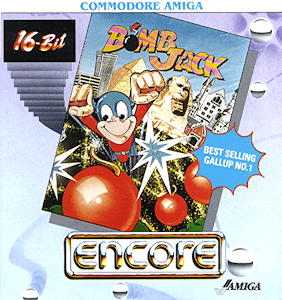
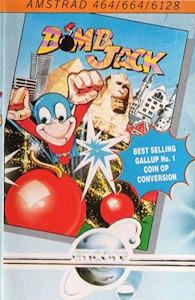
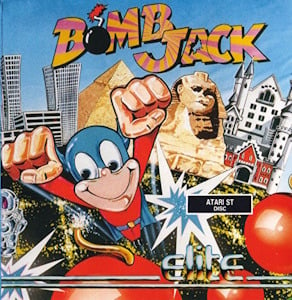
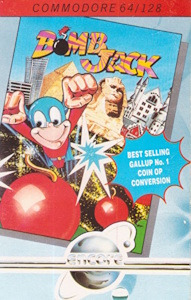
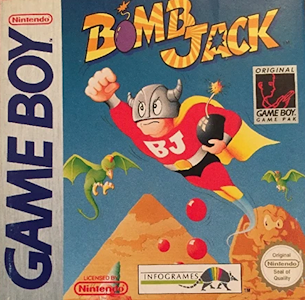
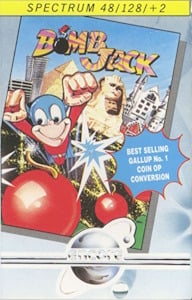
Memories of Bomb Jack
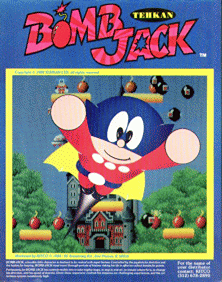
It was the summer of 1985, and the mall was alive with the hum of neon lights, chatter, and synth-pop echoing from every store. As I stepped into the air-conditioned haven from the thick, humid air outside, I could already hear the electronic beeps and bursts calling me from the arcade tucked between the record store and Orange Julius. The food court was a patchwork of smells—grease from Sbarro pizza slices mingled with the sweetness of cinnamon pretzels, and the ever-present scent of buttered popcorn wafted out from the movie theater on the upper floor. I clutched a small cup of Coke in one hand and a fistful of quarters in the other, heart already racing as I made my way toward the flashing lights.
The arcade itself was a sanctuary of sound. As soon as the sliding doors opened, I was hit with the clash of electronic explosions, the bloops of high scores, and the occasional cheer from some kid hitting a jackpot on the ticket-spewing machines. It was dark inside except for the multicolored glow of the machines, which cast a surreal flicker across the faces of every player. Nestled along the back wall, not far from the Galaga cabinet and a sticky soda machine, was Bomb Jack. The cabinet stood proud with its bright, comic-style artwork of Jack soaring across the cityscape, arms stretched like a superhero as bombs and pyramids filled the screen behind him.
I slid a quarter into the slot, and the machine gave its satisfying ka-chunk in return. The attract mode faded, and the title screen’s triumphant chiptune fanfare kicked in. Bomb Jack, a caped superhero of sorts, zipped across the screen as I pressed start. The first level loaded with its colorful backdrop of ancient Egyptian pyramids and a sky full of bouncing bombs. I was instantly pulled in. The gameplay was electric—fast, tight, and deceptively simple. I tapped the jump button to send Jack flying upward in graceful arcs, trying to collect bombs in the order they lit up for bonus points, all while dodging roving enemies that seemed to close in just when I thought I was safe.
There was something mesmerizing about the sounds. The bomb collection had this sparkling jingle, like a star being caught mid-fall, and every enemy taken out with a “power ball” turned into a chirping chorus of cartoonish screams. The music looped with a bouncy urgency that kept my adrenaline up, even as I fumbled my third level. I could feel the worn edges of the joystick, slightly sticky from previous players, and the soft resistance of the red and white buttons that had likely seen thousands of frantic thumbs before mine. The cabinet vibrated faintly with the action, making it feel like you were in the game.
By my second or third play, a small crowd had gathered behind me. A younger kid munched on a slice of pizza, his fingers greasy as he watched me weave through enemies. A teenager in a sleeveless Van Halen tee gave me a nod when I cleared the fourth level. Between rounds, I leaned back, took a sip of my now-watery Coke, and let the ambient arcade noise wash over me. The mix of laughter, frustration, victory cheers, and arcade sounds formed a kind of music that only existed in places like this. Outside the arcade, the mall bustled with kids shopping for cassette tapes, moms carrying JC Penney bags, and teens hanging by the photo booth, but in here, time stood still.
I lost my final life trying to rush the last bomb in a level set against a futuristic city skyline. The screen blinked back to the attract mode, the music taunting me to try again. I stepped away, wiping my hands on my jeans and thinking about how Bomb Jack had somehow felt more exciting than the other games. It had that perfect blend of charm, challenge, and chaos. I didn’t know then that it had come from a Japanese developer called Tehkan just a year earlier, or that it would later appear on home computers like the Commodore 64 and ZX Spectrum. All I knew was that for a few bright minutes, I was Jack—soaring, dodging, collecting bombs—and that I’d be back with more quarters soon.
Related Searches
Bomb Jack is available to purchase and download from a range of vendors. Always shop....
Bomb Jack may be available to download as abandonware from one of the many sites that offer this...
There are various sites out there that can offer cheat codes for games. Search now to find all available...
There are many sites out there that have collated and documented historic reviews of this game. Search now...
We don't host or link to rom sites for this game. However, there are many sites out there that may be...
The initial release date for Bomb Jack is stated as March 1984. Other ports of the game may....
Bomb Jack is available to purchase and download from the link(s) shown further up this....
There are multiple sites around the internet that offer visual guides to this game. Search now to find the....








